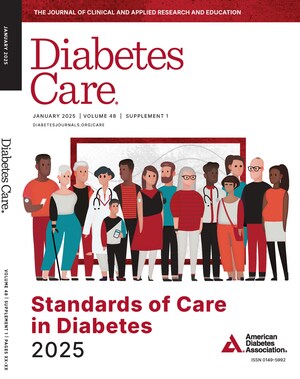ARLINGTON, Va., March 27, 2019 /PRNewswire/ -- Today, the American Diabetes Association® (ADA) issued important updates to the 2019 Standards of Medical Care in Diabetes (Standards of Care), in annotations as the Living Standards of Care, focused on improving cardiovascular and renal health in people with diabetes. The updates were informed by newly published research and crafted and approved by the ADA's Professional Practice Committee, which is responsible for producing the annual Standards of Care. The Living Standards of Care are available immediately online at Diabetes Care.
Atherosclerotic cardiovascular disease (ASCVD) is the leading cause of morbidity and mortality for individuals with diabetes, and heart disease is the cause of one in four deaths in the U.S. Diabetes is the leading cause of chronic kidney disease, and approximately one out of four adults with diabetes has kidney disease. Recently published research indicated an urgent need to update the 2019 Standards of Care to ensure optimal treatment recommendations for people with cardiovascular disease and diabetes, and for those with chronic kidney disease and diabetes. The March 27 Living Standards of Care updates are:
- Section 10 was updated based on the outcome of Reduction of Cardiovascular Events with Icosapent Ethyl–Intervention Trial (REDUCE-IT), which determined the addition of icosapent ethyl to statin therapy for patients with high triglyceride levels reduced cardiovascular events. The Standards of Care now include a recommendation that icosapent ethyl be considered for patients with diabetes and atherosclerotic cardiovascular disease (ASCVD) or other cardiac risk factors on a statin with controlled LDL-C, but with elevated triglycerides (135-499) to reduce cardiovascular risk.
- Sections 9, 10, and 11 have been revised based on findings from The Dapagliflozin Effect on Cardiovascular Events-Thrombosis in Myocardial Infarction 58 (DECLARE-TIMI 58) Trial, in which dapagliflozin treatment showed a reduction of hospitalization for heart failure and a reduction in progression of CKD.
- Based on a revision to the prescribing information for dapagliflozin, for patients with diabetes and CKD, the approved use per estimated glomerular filtration rate (eGFR) has been revised from ≥60 mL/min/1.73 m2 to ≥45 mL/min/1.73 m2 in Section 11 of the Standards of Care.
"New research can lead to improved patient outcomes and quality of life, and the American Diabetes Association is proud to continue to provide the most current evidence-based guidelines for people living with diabetes. These Living Standards of Care updates via the online annotations to our yearly Standards of Care enable us to translate and communicate significant research findings that will empower health professionals to provide optimal care for millions of Americans living with diabetes," said the ADA's Chief Scientific, Medical and Mission Officer William T. Cefalu, MD.
The Standards of Care provide the latest in comprehensive, evidence-based recommendations for the diagnosis and treatment of children and adults with type 1, type 2 or gestational diabetes; strategies to improve the prevention or delay of type 2 diabetes; and therapeutic approaches that reduce complications and positively affect health outcomes. Beginning in 2018, the ADA updates and revises the online version of the Standards of Care throughout the year, with annotations for new evidence or regulatory changes that merit immediate incorporation. The online version of the Standards of Care will include any research updates or policy changes that are approved throughout 2019.
Updates to the Standards of Care are established and revised by the ADA's Professional Practice Committee (PPC). The committee is a multidisciplinary team of 14 leading U.S. experts in the field of diabetes care and includes physicians, diabetes educators, registered dietitians and others whose experience includes adult and pediatric endocrinology, epidemiology, public health, lipid research, hypertension, preconception planning and pregnancy care. For the 2019 Standards of Care, two designated representatives from the American College of Cardiology (ACC) reviewed, provided feedback and endorsed the recommendations for cardiovascular disease and risk management on behalf of the ACC. The PPC performs an extensive, global clinical diabetes literature search each year for the annual Standards of Care update, supplemented with input from ADA leaders and staff and the medical community at-large. Members of the PPC must disclose potential conflicts of interest with industry and/or relevant organizations; these disclosures are available on page S184 of the 2019 Standards of Care.
The complete, annotated Standards of Care, which includes updates made today, can be accessed online on Diabetes Care. The Abridged Standards of Medical Care in Diabetes have also been updated and can be accessed online on Clinical Diabetes.
About Diabetes Care®
Diabetes Care, a monthly journal of the American Diabetes Association (ADA), is the highest-ranked, peer-reviewed journal in the field of diabetes treatment and prevention. Dedicated to increasing knowledge, stimulating research and promoting better health care for people with diabetes, the journal publishes original articles on human studies in clinical care, education and nutrition; epidemiology, health services and psychosocial research; emerging treatments and technologies; and pathophysiology and complications. Diabetes Care also publishes the ADA's recommendations and statements, clinically relevant review articles, editorials and commentaries. Topics covered are of interest to clinically oriented physicians, researchers, epidemiologists, psychologists, diabetes educators and other health care professionals.
About the American Diabetes Association
Approximately every 21 seconds, someone in the United States is diagnosed with diabetes. Nearly half of the American adult population has diabetes or prediabetes, and more than 30 million adults and children are living with the disease. The American Diabetes Association (ADA) is the nation's leading voluntary health organization on a mission to prevent and cure diabetes, as well as improve the lives of all people affected by the disease. For nearly 80 years, the ADA has driven discovery by funding research to treat, manage and prevent all types of diabetes, while working relentlessly for a cure. Magnifying the urgency of this epidemic, the ADA works to safeguard policies and programs that protect people with the illness, those at risk of developing diabetes and the health care professionals who serve them by initiating programs, advocacy and education efforts that can lead to improved health outcomes and quality of life. To learn more or to get involved, call 1-800-DIABETES (1-800-342-2383) or visit us at diabetes.org. Information is available in English and Spanish. Join the conversation with us on Facebook (American Diabetes Association), Twitter (@AmDiabetesAssn) and Instagram (@AmDiabetesAssn).
Contact: Michelle Kirkwood, 703-299-2053
[email protected]
SOURCE American Diabetes Association
Related Links
WANT YOUR COMPANY'S NEWS FEATURED ON PRNEWSWIRE.COM?
Newsrooms &
Influencers
Digital Media
Outlets
Journalists
Opted In






Share this article